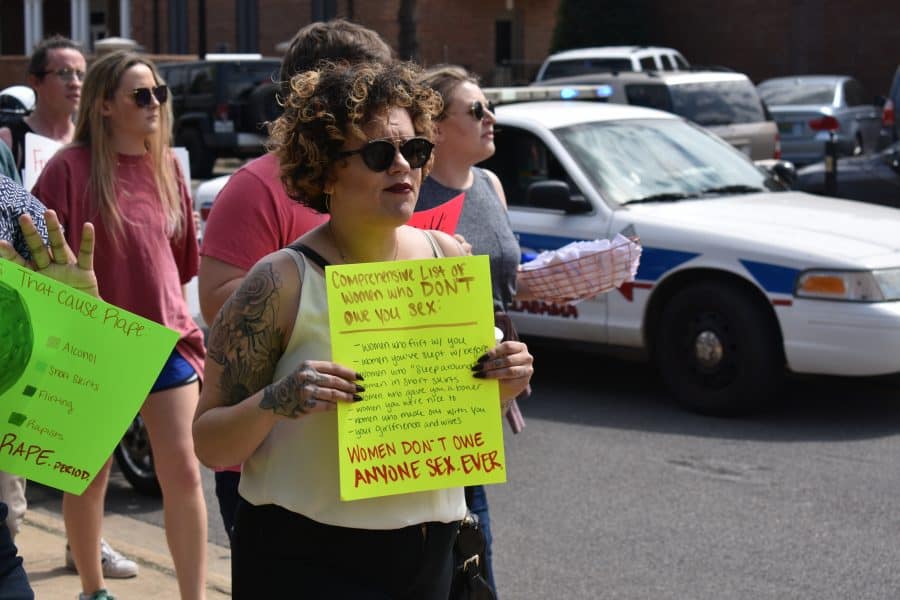As Emily Triolet, a sophomore majoring in public relations and cofounder of the UA Walk of Shame, stood waiting by Denny Chimes in her pink bathing suit, she was catcalled.
“It didn’t faze me, getting catcalled, because I’m used to it,” Triolet said.
Triolet’s pink bathing suit represents more than a hot day to her. She said it was in that pink bathing suit that she was assaulted. Triolet said she was 18 years old, and she was asleep in a tent on a camping trip when a male friend decided to wake her up in a “special way.”
“I’m lucky that I don’t remember all of it,” Triolet said. “I know that a lot of other people that aren’t as lucky.”
Triolet had dressed specifically for the second annual Walk of Shame. She and 20 other people walked scantily-clad to advocate for an end to sexual assault and victim blaming on The University of Alabama campus.
According to the 2017 UA Campus Security and Fire Safety Report, 21 rapes were reported on campus in 2016. Of those 21, 18 occurred in a residence hall.
The Rape Abuse and Incest National Network said only 310 out of every 1,000 sexual assaults are reported to police, meaning more than two thirds of sexual assaults go unreported.
Triolet said part of the problem of sexual assault stems from cultural norms.
“We have a culture of disrespect and coercive behavior,” Triolet said. “You don’t owe someone something because you laugh at their jokes, or accept a vodka cranberry from them.”
The group walked from Denny Chimes, passed the fraternity houses on University Boulevard, then looped around on 4th Street and back toward Denny Chimes.
As they walked, they caught the attention of many – drivers, bystanders and fraternity members. Darties around frat row seemed to stop in awe as the group of people armed with bullhorns, poster boards and pink bathing suits marched on their row, but blank stares turned into woos, laughs, and snickers. People outside the fraternity houses took pictures and videos and stared as the participants walked by.
Co-founder of the UA Walk of Shame, Annabeth Mellon, a sophomore majoring in women’s studies and telecommunication and film, said they got the responses they were supposed to get during the walk.
“Honestly I was like ‘I hope you are laughing at me and put me on your social media,’” Mellon said.
Triolet said she was happy with the turnout for the event and the group of people they attracted.
As the walk began, walkers chanted phrases including:
“2-4-6-8, stop the violence, stop the rape!”
“Say it once, say it again, no excuse for violent men!”
“However we dress, wherever we go, yes means yes, no means no!”
Toward the end of the march, the generic chants morphed into a direct calling out against prominent, accused rapists nationally and locally: Donald Trump, Roy Moore and TJ Bunn.
Taliafferio Coleman, an attorney for Five Horizons Health Services, said he attended this event because in his work he hears stories of victims of sexual assault and how they have contracted diseases because of that violence. Coleman said he feels like the University could do better to help women who are victims of sexual assault.
“I believe they could do a lot better, whether that’s intake, keeping up with qualitative and quantitative data or even how they respond to sexual assault cases on campus,” Coleman said.
After the walk concluded, the co-founders of the walk spoke in front of Denny Chimes about the importance of the event and Mellon read anonymous stories of survivors of sexual assault.
“It takes a long time to share your story,” Mellon said. “For some, sharing your story is empowering.”
Mellon said she has always felt strongly about victim blaming and assault. As a survivor of sexual abuse and assault herself, Mellon said people she spoke to said she asked for it and called her a slut.
The Walk of Shame spoke of services for those victimized by sexual assault, including the Women and Gender Resource Center. Apart from the WGRC, there is also the Turning Point Domestic Violence and Sexual Assault Services, University of Alabama Police Department, the University of Alabama Counseling Center and the Title IX Office.









